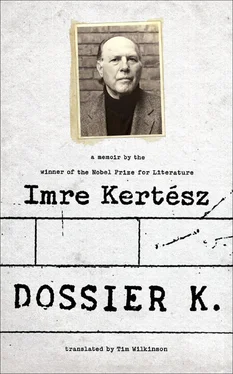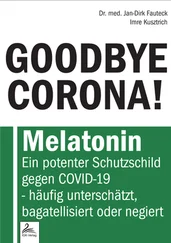Köves learns, though as it happened I too was informed of that by the strangers who were living in the house.
And that important conversation with the two old codgers?
Pure fiction, though it’s possible we really did talk about something of the kind. As I have said already, the figure of György Köves more closely resembles the person who wrote the novel than the person who actually lived through it. For the person who wrote the novel the situation was important, the cathartic moment when Köves doesn’t just realize but is able to interpret his fate, and in the novel this had to occur in the novelistic time and place that happen to be in the presence of the two old codgers.
I have every respect for your detachment, and the fact that you manifestly prefer to hide behind your novel character rather than tell me what exactly happened to you in those days immediately following your return home to Hungary. Yet as you yourself have already pointed out, the world must have altered profoundly for you .
It is precisely those first days that I have little recollection of; all that’s stayed with me are fleeting impressions. When I stepped out of the Western Railway Terminal onto what was then Berlin (later Marx and now Western) Square the sun was dazzling, and a loudspeaker at the stop for the Number 6 tram was blaring out the hit tune “You’re the Light in the Night.” Next to me there was a fairly well-dressed man who was offering “corn cakes” from a tray slung round his neck. I remember the news vendors, or hawkers as they were called, who would yell out newspaper titles or headlines that one could never make out. Those first days in general were ablaze with sunlight; it was summer. I was going around in a foreign world where I had suddenly caught a whiff of freedom, especially on the streets. At home people talked about sombre matters, took stock of their losses and weighed up the uncertain future that lay ahead. I couldn’t pay much heed to that. I recall the office of the Budapest-Salgótarján Engineering Works where I took my mother by surprise. Her female colleagues, whom I knew myself from the earlier days, all rushed out to hug me and were deeply moved. The news that I had “come home from the Lager” spread, and I was asked all manner of stupid questions. I would wake up at night tormented by an unbearable itching. I would switch on the light, convinced that lice were crawling over me, but they weren’t: my body was covered with red spots, I had an allergy of some kind. Mother took me to see the works doctor — a Dr. Bock, as I recollect to this day. He advised injections of calcium, and I was greatly moved when he took hold of my arm and carefully inserted the syringe in my vein: I had grown totally unused to people treating me that way. In short, I was ringed on all sides by surprises until everyday life was slowly restored.
How did the news of your father’s death take you?
You’re asking me an impossible question and forcing me to resort to banalities.
Perhaps, but I’m still interested .
You may be right. It may be worth considering how my life might have worked out if I had stayed with my father.
Well, how?
Just the same, I suppose, only at the price of yet more grueling fights. Father would obviously have insisted that I take on a “respectable” occupation of some kind, whereas I would have slipped back in a psychosis of permanent rebellion. But if I think about it more carefully, it’s possible that I did that anyway, except that I continued my fight against Father without him, which in the absence of his robust presence led to a transcendence. Like an arrow that misses its immediate target and vanishes into the distance.
I beg your pardon, but that’s one of Arthur Koestler’s similes . Arrow in the Blue was the title of one of his volumes of autobiography .
Thank you for reminding me. I’ve read the book, of course, so my simile may be the product of subconscious Freudian brainwork, but then Koestler, too, was a Jew from Budapest, and he, too, was in conflict with his family, with the bourgeois mode of existence, with Communist salvationism, and ultimately with himself.
As best I know, you, too, became one of Communism’s “captive minds,” if I may allude to the title of Czeslaw Milosz’s celebrated book .
Naturally; it would have been a wonder if I hadn’t. On my return from Auschwitz I fell in with an interesting group of people among whom I soon had to make my first clear choices: for instance, whether I was to remain in Hungary or leave, because those were the arguments that flew around in 1946 and ’47 during the “shindigs” that would evolve out of tea parties into rum drinking at the homes of those of my classmates who had bigger places or at least their own rooms. By then the tidy order of the B stream had broken down; several of my Jewish friends had been lost — they perished during the war or they did not go back to school — or pupils asked for permission to transfer from the crowded A stream, or new boys enrolled. The world had changed. One gorgeous morning in September 1945, when I turned off the Grand Boulevard into Barcsay Street in order to pick up my schooling at the Madách Gymnasium where I had left it before Auschwitz, an edifying scene played out before my view: gym master Csorba, moustache twitching, his face terrified, was hurrying toward the Grand Boulevard with a pack of pupils at his heels, the leader of whom was yelling with his fist raised in anger: “Lousy Fascist! The brass neck of you coming back to the school as a teacher!” That student, incidentally, went on later to become a well-known film director. We happened to meet at some reception in the early ’90s, and I reminded him of that long-past scene. He looked at me in amazement: he had no memory of it.
Really?
I can’t say if he really had forgotten, but at all events fifty years later, after another historical turning point — the fall of Communism — he was unwilling to accept that identity. But then again, I think that generation — my own generation — has had to endure too many such wrenching turning points for its identity to remain continuous and intact.
And has your own, I wonder?
There are times when I delude myself into thinking it has, but then at other times I recollect certain periods of my life as though a stranger had lived them, certain actions of mine as if they had not been my actions. But being a writer I am constantly working on my identity, and as soon as I come across it I lose it straight away, because I confer it on the protagonist of one of my novels, so I can start the whole process from the beginning all over again. It’s not always easy to be in full possession of ourselves. “Not everyone who is born is in the world,” writes Dezső Szomory in that marvellous 1934 novel of his, Mr. Horeb, the Teacher .
But you not only were in the world, you also wanted to change the world. You joined the Communist Party …
Not with the aim of seeking salvation for the world, though.
Driven by ressentiment, perhaps? György Köves comes home from Buchenwald concentration camp, and to the question put to him on the tram by the reporter as to what he was feeling about being back home again and seeing the city he had left, he replies: “Hatred.”
That is one of the most misunderstood, or perhaps better: misinterpreted sentences in Fatelessness .
So, let’s put it in its proper place .
No, let’s not. It’s a good thing for a novel to have certain words that live on in readers like a blazing secret.
There are lots of words like that in Fatelessness: “happiness,” for instance, or “homesickness” …
Читать дальше












